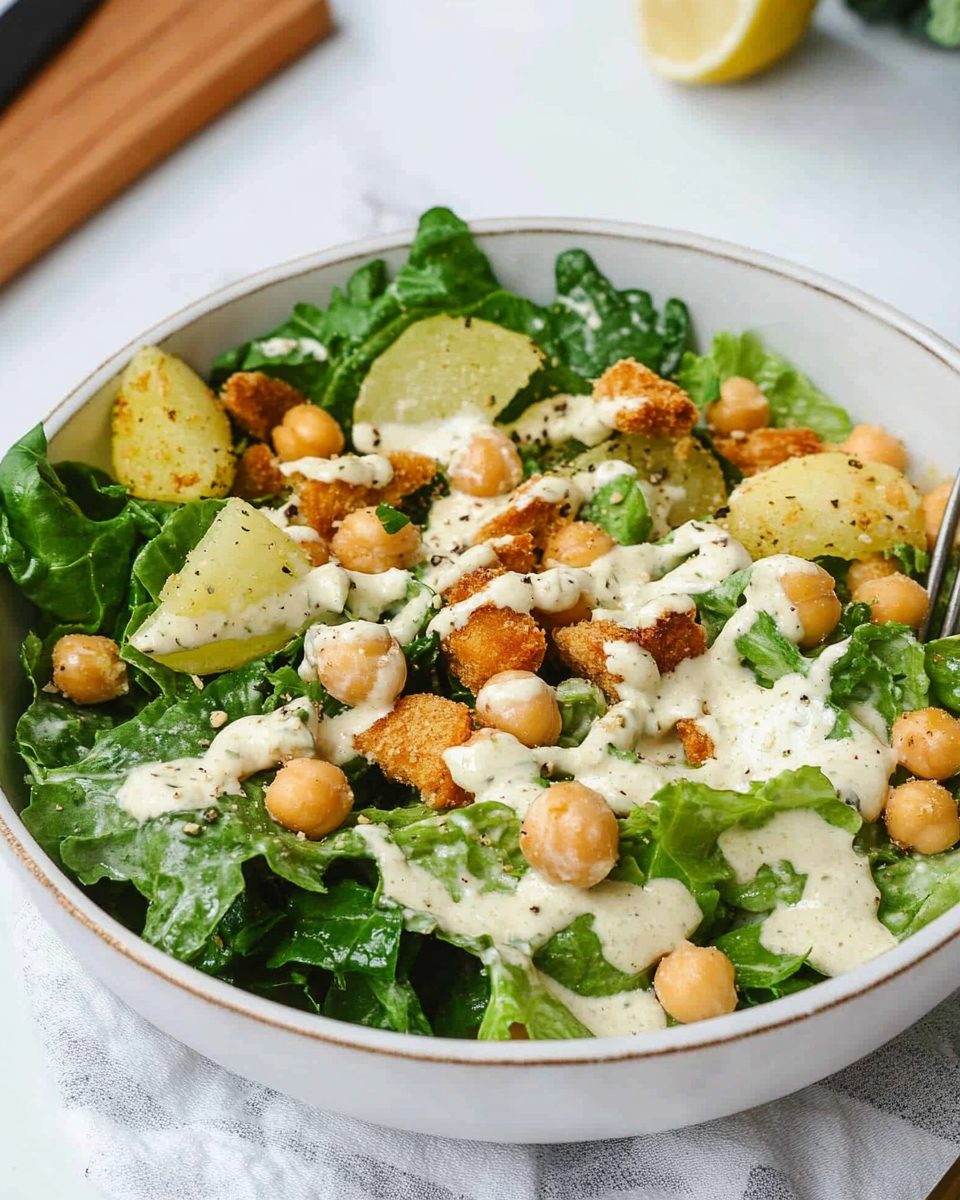The Vegan Caesar Salad with Cashew Dressing is a fresh, vibrant twist on the traditional Caesar salad, crafted to delight both vegans and anyone seeking a healthier, plant-based alternative.
FULL RECIPE
Ingredients
- 1 large head romaine lettuce, chopped
- 1 cup croutons (store-bought or homemade)
- 2 tablespoons capers (optional)
- 1 tablespoon nutritional yeast
1.For the Cashew Dressing
- ¾ cup raw cashews (soaked for 2–4 hours or boiled for 10 minutes)
- ½ cup water
- 2 tablespoons lemon juice
- 1 tablespoon Dijon mustard
- 1 tablespoon caper brine or apple cider vinegar
- 1 clove garlic
- ½ teaspoon sea salt
- Freshly ground black pepper to taste
Directions
- If you haven’t soaked the cashews, boil them for 10 minutes, then drain.
- Add all dressing ingredients to a blender: soaked cashews, water, lemon juice, Dijon mustard, caper brine, garlic, salt, and pepper. Blend until smooth and creamy.
- Taste and adjust seasoning if needed. Add more water for a thinner consistency if desired.
- In a large bowl, toss chopped romaine with the cashew dressing until well coated.
- Add croutons, capers (if using), and sprinkle with nutritional yeast.
- Serve immediately or chill for 15–30 minutes for enhanced flavor.
Nutritional Information
- Calories: 260
- Total Fat: 17g
- Saturated Fat: 3g
- Trans Fat: 0g
- Cholesterol: 0mg
- Sodium: 420mg
- Total Carbohydrates: 20g
- Dietary Fiber: 4g
- Sugars: 2g
- Protein: 7g
- Vitamin A: 80% DV
- Vitamin C: 25% DV
- Calcium: 6% DV
- Iron: 10% DV
The Origin of Caesar Salad and Its Vegan Evolution
The Caesar salad, traditionally attributed to restaurateur Caesar Cardini in the 1920s, is a classic dish known for its creamy anchovy-based dressing and crunchy romaine lettuce. Over time, this iconic salad has undergone many adaptations, reflecting dietary trends and preferences. The vegan Caesar salad, like the one with cashew dressing, reinvents this classic by removing animal products while maintaining the creamy texture and bold flavors that make the original beloved. This evolution represents how culinary traditions can be both preserved and innovated to accommodate plant-based lifestyles.
Why Cashews Make an Ideal Base for Vegan Dressings
Cashews are often the nut of choice in vegan cooking because of their creamy texture when blended. Unlike many other nuts, cashews have a relatively neutral flavor and a smooth, buttery consistency that mimics dairy-based sauces perfectly. This makes them a fantastic base for dressings like Caesar, where creaminess is key. Their healthy fats also add richness and help the dressing cling well to the salad ingredients, creating a satisfying mouthfeel.
Nutritional Benefits of Using Cashews in Salad Dressings
Cashews are rich in heart-healthy monounsaturated fats, which can help reduce bad cholesterol and promote cardiovascular health. They also provide essential minerals such as magnesium, phosphorus, and zinc, which support bone health and immune function. The presence of antioxidants in cashews helps combat oxidative stress. When used in dressings, cashews not only add flavor but also boost the nutrient density of the meal, making the vegan Caesar salad both delicious and nourishing.
The Role of Nutritional Yeast in Vegan Caesar Dressing
Nutritional yeast is a deactivated yeast packed with B vitamins, including B12 when fortified, which is crucial for those on a vegan diet. It has a natural cheesy, umami flavor that enhances the savory depth of the dressing without using dairy. Adding nutritional yeast in the vegan Caesar salad dressing provides that familiar cheesy note reminiscent of traditional Caesar recipes, bridging the gap between vegan and classic tastes.
Lemon Juice and Its Impact on Flavor and Health
Lemon juice serves multiple purposes in vegan Caesar dressing. Its bright acidity balances the richness of the cashews and adds a fresh, tangy note that livens up the salad. From a health perspective, lemon juice is an excellent source of vitamin C, which supports immune health and enhances iron absorption from plant foods. The acidity also acts as a natural preservative, helping the dressing stay fresh longer when stored properly.
The Importance of Texture in Salad Dressings
Texture plays a crucial role in the enjoyment of salads, especially for vegan versions that lack traditional creamy ingredients like eggs or dairy. The cashew dressing achieves a smooth and velvety texture that coats the lettuce leaves evenly. The contrast between the creamy dressing and crunchy croutons creates a satisfying bite that elevates the overall eating experience, demonstrating how texture can make or break a salad’s appeal.
Versatility of Vegan Caesar Salad in Meal Planning
Vegan Caesar salad is highly versatile and fits well into many meal plans. It can be served as a light lunch, a side dish for dinner, or even a hearty appetizer. It complements a variety of cuisines and proteins, such as grilled tofu, tempeh, or roasted chickpeas, making it an adaptable option for vegans and non-vegans alike. Its balance of fats, protein, and fiber helps keep you full and energized throughout the day.
Environmental Benefits of Choosing Vegan Over Traditional Caesar Salad
Choosing a vegan Caesar salad reduces the environmental footprint compared to its traditional counterpart. Dairy and anchovy production contribute significantly to greenhouse gas emissions, water use, and habitat destruction. By using plant-based ingredients like cashews and nutritional yeast, this salad helps conserve natural resources and supports sustainable eating practices, aligning with the growing global push towards eco-friendly diets.
Common Variations and Add-ons to Customize Your Vegan Caesar Salad
This vegan Caesar salad recipe is a wonderful base for creativity. Popular additions include roasted chickpeas for extra protein, avocado slices for added creaminess, or sun-dried tomatoes for a burst of umami. You can swap romaine lettuce for kale or mixed greens for different textures and flavors. Each variation allows you to tailor the salad to your taste preferences and nutritional needs, making it a flexible recipe that never gets boring.
How to Make Homemade Croutons for Extra Crunch
Croutons are essential to the Caesar salad experience, adding a toasty crunch that contrasts with the crisp lettuce and creamy dressing. Making croutons at home is simple and allows you to control the ingredients, avoiding preservatives and excess sodium often found in store-bought versions. By using olive oil, garlic, and herbs, you can create flavorful croutons that elevate the salad while keeping it wholesome and fresh.
Tips for Storing and Serving Vegan Caesar Salad
To maintain freshness, it’s best to store the dressing and salad components separately until ready to serve. This prevents the lettuce from wilting and keeps the croutons crisp. The dressing can be refrigerated for up to a week in an airtight container, and the salad should be tossed just before eating. For best flavor, let the dressed salad rest for a few minutes to allow the flavors to meld without losing the crunch.
How Vegan Caesar Salad Fits into a Balanced Diet
This salad offers a well-rounded combination of healthy fats from cashews, fiber from lettuce, and vitamins from lemon and nutritional yeast. It’s naturally low in cholesterol and refined sugars, making it a heart-friendly option. Including such salads in your diet promotes nutrient diversity and encourages consumption of whole plant foods, which are linked to lower risks of chronic diseases and better overall health.
Conclusion
The vegan Caesar salad with cashew dressing is a delicious, nutritious, and environmentally friendly reinterpretation of a classic favorite. Its creamy texture, bold flavors, and wholesome ingredients make it a versatile dish suitable for a variety of meals. Beyond taste, it offers significant health benefits while supporting sustainable eating habits. Whether you’re vegan or simply looking to add more plant-based meals to your diet, this salad is an excellent choice that satisfies both palate and conscience.






